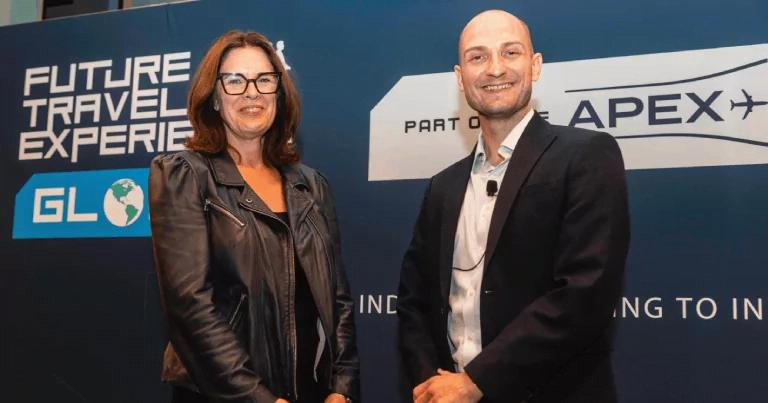There are challenges faced by the aviation industry that can be solved by robotics, and connecting the two industries for brainstorming and problem solving is beginning to yield results, according to Christina Cassotis, CEO of the Allegheny County Airport Authority.
Cassotis, who as CEO oversees Pittsburgh International Airport (PIT), said a quickly planned summit held earlier this year in partnership with Future Travel Experience has representatives from both industries thinking about aviation in new ways.
“It was really great to have roundtables of airports, airlines and roboticists, led by design-thinking folks, come together,” Cassotis said. “They came up with lots of solutions to industry problems that the industry didn’t know robotics or AI or any of the automation could solve.”
Cassotis said that Pittsburgh is known as the “robotics capital of the world” and that, coupled with the fact that PIT is in the midst of a new terminal construction, provides an ideal environment for assessment and testing of robotic solutions for aviation. Noting the success of the initial summit, Cassotis said PIT will once again be the host airport for the Future Travel Experience’s Aviation & Robotics Summit in May 2024. The FTE Aviation & Robotics Summit 2024 will bring together aviation and robotics industry professionals with the primary goal of solving aviation business and operational challenges with robotics solutions. Cassotis and FTE COO Ryan Ghee made the announcement earlier this week at the FTE Conference in Long Beach.
Robotics are one component to a larger range of technology advancements that could come into play in the new terminal at PIT. Cassotis said her team is exploring various options as construction continues.
“We’re actually figuring our [our technology approach] based on customer journey and based on what passengers are expecting,” Cassotis said. “Here’s what we know: Not everybody wants everything to be tech-driven. There are also people who are challenged with things that perhaps the business traveler is not challenged with, [such as] strollers, wheelchair, IT needs, et cetera. We’re going to have a pretty fierce focus on accessibility, making sure that the airport works for lots of people and that technology enables [that access], but [tech solutions are] not being done for the sake of the technology.
“What I care about is, how we use technology? How do we use data? How do we use automation to enhance what people want to get done when they’re traveling, but also make sure that we can do something when things go wrong?” Cassotis added.
Supporting tenants and partners as well as passengers is also top of mind, Cassotis said. “Where is our opportunity to support our partners so that they can take care of the passenger better? And how much of that is going to be based in technology and how much of that is going to be based in technology plus people?” Cassotis asked. “Those are the kinds of things that we’re looking at much more closely. [For example], how do we make sure that concessions are staying open late enough to deal with [PIT’s many flight] diversions and where are the opportunities around that? And that’s going to come from data. It’s going to come from observation, it’s going to come from talking to people, and it’s going to come from trial and error.”
The concessions program itself will be undergoing a revamp as terminal construction continues. PIT recently severed ties with its developer partner, Fraport USA, and Cassotis said her team is now considering options going forward. “I think it will be a hybrid model, with prime vendors and individual concessionaires, but we’re figuring that out still,” she said. The developer model isn’t under consideration currently but Cassotis said, “I wouldn’t shut the door on anything at this point.”






